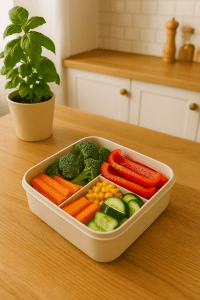Modern life can be hectic, and in the rush of work, family, and endless commitments, it’s easy to reach for quick fixes—coffee to power through fatigue and takeaway meals when you’re short on time. But while these habits might feel convenient in the moment, they can often leave you feeling more drained, less healthy, and spending more money than you’d like.
Two small but powerful shifts—reducing your caffeine intake and making your own lunch—can transform your daily energy, health, and sense of control. These changes don’t require extreme diets or rigid routines. Instead, they encourage mindful, sustainable adjustments that set you up for long-term well-being.
In this post, we’ll explore why cutting out caffeine and preparing your own lunch are game-changing habits, and how to embrace them in a realistic way that fits your lifestyle.
Cutting Out Caffeine: Why Less Can Mean More
For many of us, caffeine is a lifeline. Whether it’s a steaming mug of coffee first thing in the morning, a tea break mid-afternoon, or an energy drink before a workout, caffeine often feels essential. But while it provides a short burst of alertness, the long-term effects can leave your body overstimulated, your energy unstable, and your sleep disrupted.
The Benefits of Reducing Caffeine
- Stabilised Energy Levels
Caffeine creates a spike of energy, but it’s often followed by a crash. This rollercoaster can leave you feeling exhausted, moody, or reliant on another cup just to function. By reducing caffeine, you’ll allow your body to regulate energy more naturally, leaving you with steadier focus throughout the day. - Improved Sleep Quality
Even if you drink coffee only in the morning, caffeine can linger in your system for up to 6–8 hours, disrupting your ability to fall asleep or preventing deep, restorative rest. Cutting back helps your body settle into its natural sleep rhythm. Better sleep means better mood, sharper thinking, and more energy. - Reduced Anxiety and Stress
Caffeine stimulates your nervous system, which can worsen feelings of stress and anxiety. Many people notice that when they reduce caffeine, they feel calmer and more grounded in stressful situations. - Better Digestion and Hydration
Caffeine is a mild diuretic, which means it can contribute to dehydration and irritate the digestive system. Swapping caffeinated drinks for water or herbal teas supports digestion and keeps your body better hydrated.
Tips for Cutting Down on Caffeine

- Take It Slowly
Don’t go “cold turkey” unless you want to risk headaches, fatigue, and irritability. Instead, reduce your intake gradually over one to two weeks. For example:- Swap your second coffee for herbal tea.
- Try half-caff (a mix of caffeinated and decaf).
- Replace energy drinks with sparkling water.
- Find Alternatives You Enjoy
Herbal teas, chicory coffee, golden milk (turmeric latte), or simply water with lemon can provide a refreshing alternative without the caffeine spike. - Stay Hydrated
Many people confuse dehydration with fatigue, reaching for coffee when their body really needs water. Try starting your day with a glass of water before any other drink. - Prioritise Sleep and Nutrition
When you cut back caffeine, your body will adjust by craving natural energy sources. Focus on quality sleep, balanced meals, and movement to help your body thrive. - Be Mindful of Hidden Caffeine
Tea, chocolate, energy drinks, and even some medications contain caffeine. Stay aware of all your sources as you reduce your intake.
Making Your Own Lunch: A Small Habit with Big Rewards

If caffeine represents how we fuel our mornings, lunch reflects how we sustain ourselves through the day. For many, lunch is the most neglected meal—grabbed on the go, rushed, or skipped entirely. But preparing your own lunch can be a powerful way to take charge of your health, finances, and daily well-being.
The Benefits of Preparing Your Own Lunch
- Better Control Over Ingredients
When you make your own lunch, you decide exactly what goes into it. That means less processed food, more whole ingredients, and better portion sizes tailored to your body’s needs. - Healthier Choices Without Sacrifice
Homemade lunches allow you to include more fruits, vegetables, lean proteins, and whole grains—all without the excess salt, sugar, and unhealthy fats often found in pre-packaged or takeaway meals. - Saving Money
Buying lunch daily adds up quickly. Even a modest £5 meal each weekday is £25 a week, or £1,300 a year. Preparing your own lunch can cut that cost by more than half, freeing up money for experiences or savings. - Consistency and Energy
When you prepare your own lunch, you’re less likely to skip meals or rely on quick-fix snacks. This keeps your blood sugar stable, prevents afternoon slumps, and helps you stay focused at work. - Environmental Benefits
Preparing food at home often means less packaging waste compared to takeaway containers and single-use plastics. It’s a small step toward a greener lifestyle.
Practical Tips for Making Your Own Lunch
- Batch Cook and Prep Ahead
Spend an hour on Sunday preparing big-batch items like roasted vegetables, grilled chicken, or grain salads. Portion them into containers for the week ahead. - Keep It Simple
Lunch doesn’t need to be elaborate. A sandwich with whole grain bread, hummus, and fresh veg can be just as nourishing as a hot meal. - Invest in Good Containers
Reusable, leak-proof containers and a good insulated bag make meal prep more enjoyable and practical. - Rotate Your Options
Avoid getting bored by creating a meal rotation. For example:- Monday: Chicken and veg wraps
- Tuesday: Lentil salad
- Wednesday: Tuna and avocado sandwich
- Thursday: Quinoa bowl with roasted veg
- Friday: Homemade soup with whole grain bread
- Prepare Snacks Too
Having cut fruit, nuts, or yoghurt on hand prevents you from grabbing vending machine snacks or sugary treats when hunger strikes.
The Combined Impact on Well-Being

What happens when you cut back on caffeine and start making your own lunch? You build a lifestyle rooted in balance, mindfulness, and self-care.
- Energy without the rollercoaster: Less reliance on caffeine plus steady, nourishing meals = consistent energy throughout the day.
- Improved sleep and recovery: Better sleep from reduced caffeine, plus nutritious lunches, helps your body repair and restore overnight.
- Financial savings: Skipping both takeaway coffees and daily lunches adds up to hundreds or even thousands saved per year.
- Confidence and control: You feel more capable when you’re in charge of your food and energy habits.
These changes might seem small, but together they form a foundation for long-term health. And the best part? They’re realistic and sustainable. You don’t need to change your entire lifestyle at once—just start by swapping one habit at a time.
How to Get Started This Week
Here’s a simple challenge to try:
- Day 1–2: Replace one coffee or energy drink with herbal tea or water.
- Day 3–4: Prep a simple lunch, like a wrap or salad, the night before.
- Day 5: Review how you feel—are you less jittery, more focused, sleeping better?
Small steps matter. The goal is not perfection but progress.
Conclusion: A Healthier, Happier You

Cutting out caffeine and preparing your own lunch are simple, practical shifts that lead to significant improvements in energy, mood, finances, and overall well-being. They’re not about restriction or sacrifice—they’re about creating habits that nourish your body, calm your mind, and give you back control over your daily routine.
By embracing these changes, you’ll discover that your energy is more reliable, your meals are more satisfying, and your days flow more smoothly. Most importantly, you’ll feel empowered to make choices that truly support your well-being—one cup and one lunchbox at a time.
#HomeHarmonyProject #HealthyHabits #CutCaffeine #MealPrep #WellnessTips #BetterSleep #HealthyLifestyle #SaveMoneyEatBetter




